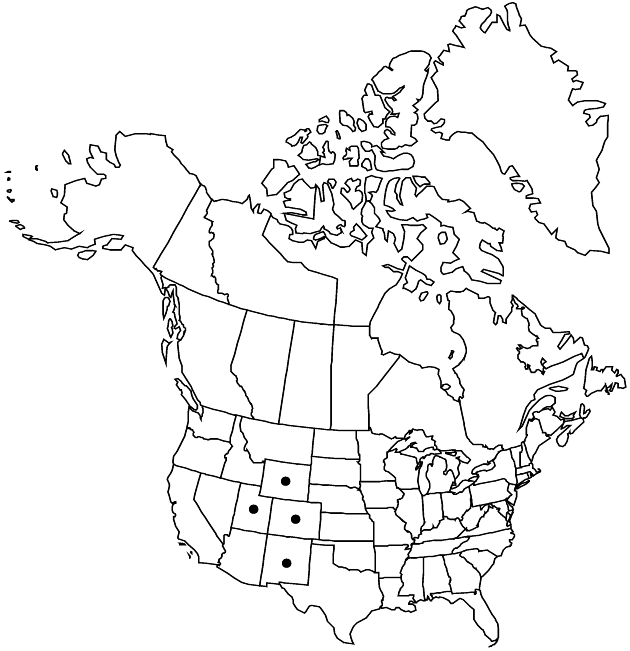Difference between revisions of "Erigeron melanocephalus"
Bull. Torrey Bot. Club 26: 246. 1899.
FNA>Volume Importer |
imported>Volume Importer |
||
| (3 intermediate revisions by 2 users not shown) | |||
| Line 8: | Line 8: | ||
}} | }} | ||
|common_names=Black-head fleabane | |common_names=Black-head fleabane | ||
| + | |special_status={{Treatment/ID/Special_status | ||
| + | |code=E | ||
| + | |label=Endemic | ||
| + | }} | ||
|basionyms={{Treatment/ID/Basionym | |basionyms={{Treatment/ID/Basionym | ||
|name=Erigeron uniflorus var. melanocephalus | |name=Erigeron uniflorus var. melanocephalus | ||
|authority=A. Nelson | |authority=A. Nelson | ||
| + | |rank=variety | ||
|publication_title=Wyoming Agric. Exp. Sta. Bull. | |publication_title=Wyoming Agric. Exp. Sta. Bull. | ||
|publication_place=28: 131. 1896 | |publication_place=28: 131. 1896 | ||
| Line 37: | Line 42: | ||
-->{{#Taxon: | -->{{#Taxon: | ||
name=Erigeron melanocephalus | name=Erigeron melanocephalus | ||
| − | |||
|authority=(A. Nelson) A. Nelson | |authority=(A. Nelson) A. Nelson | ||
|rank=species | |rank=species | ||
| Line 51: | Line 55: | ||
|publication title=Bull. Torrey Bot. Club | |publication title=Bull. Torrey Bot. Club | ||
|publication year=1899 | |publication year=1899 | ||
| − | |special status= | + | |special status=Endemic |
| − | |source xml=https:// | + | |source xml=https://bitbucket.org/aafc-mbb/fna-data-curation/src/2e0870ddd59836b60bcf96646a41e87ea5a5943a/coarse_grained_fna_xml/V19-20-21/V20_726.xml |
|tribe=Asteraceae tribe Astereae | |tribe=Asteraceae tribe Astereae | ||
|genus=Erigeron | |genus=Erigeron | ||
Latest revision as of 20:05, 5 November 2020
Perennials, 3–12(–21 at lower elevations) cm; fibrous-rooted, rhizomatous, caudices decumbent, often branched, rhizomelike, sometimes taprootlike. Stems erect, distally villous (hairs with black cross walls), minutely glandular near heads. Leaves mostly basal (persistent), some cauline; blades spatulate to oblanceolate, (10–)20–50(–150) × 4–6(–15) mm, cauline linear, bractlike, margins entire (apices rounded to retuse), faces glabrous or sparsely hirsute, eglandular. Heads 1. Involucres 6–9 × 10–14 mm. Phyllaries in 2(–3) series, sparsely villoso-sericeous (hairs flattened, cross walls black, imparting distinct black color to involucres), glandular. Ray florets 45–74; corollas white to purple, 7–11 mm (mostly 1–2 mm wide), laminae spreading, tardily coiling. Disc corollas 2.4–3.2 mm. Cypselae (oblanceoloid-oblong) 2–2.3 mm, 2-nerved, faces strigoso-hirsute; pappi: outer of setae, inner of 15–30 bristles. 2n = 18.
Phenology: Flowering Jul–Aug.
Habitat: Rocky slopes, talus, alpine and subalpine meadows, subalpine spruce-fir
Elevation: 3100–4000 m
Distribution

Colo., N.Mex., Utah, Wyo.
Discussion
Selected References
None.